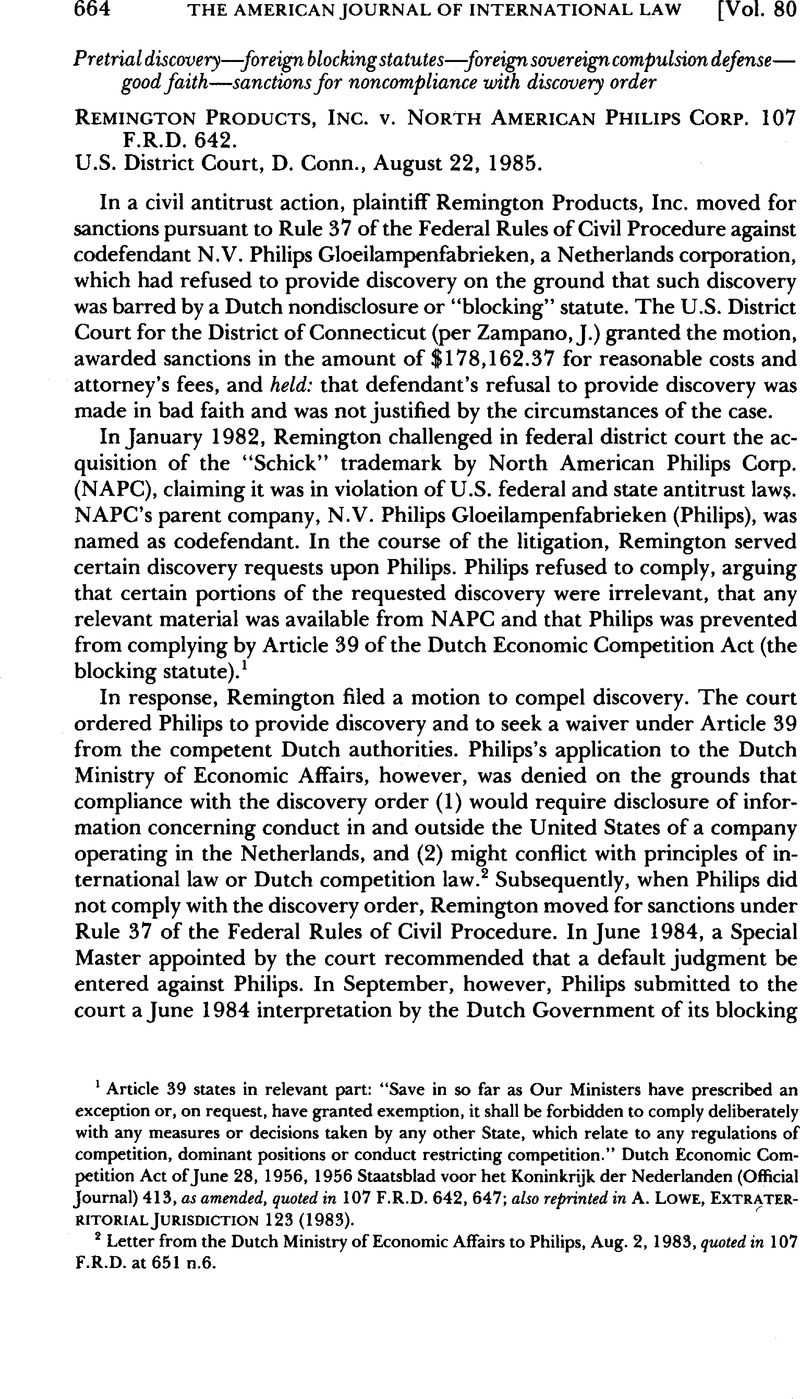Article contents
Remington Products, Inc. v. North American Philips Corp.
Published online by Cambridge University Press: 27 February 2017
Abstract

- Type
- Judicial Decisions
- Information
- Copyright
- Copyright © American Society of International Law 1986
References
1 Article 39 states in relevant part: “Save in so far as Our Ministers have prescribed an exception or, on request, have granted exemption, it shall be forbidden to comply deliberately with any measures or decisions taken by any other State, which relate to any regulations of competition, dominant positions or conduct restricting competition.” Dutch Economic Competition Act of June 28, 1956, 1956 Staatsblad voor het Koninkrijk der Nederlanden (Official Journal) 413, as amended, quoted in 107 F.R.D. 642, 647; also reprinted in Lowe, A., Extraterritorial Jurisdiction 123 (1983)Google Scholar.
2 Letter from the Dutch Ministry of Economic Affairs to Philips, Aug. 2, 1983, quoted in 107 F.R.D. at 651 n.6.
3 In March 1984, the Dutch airline KLM had applied for permission to comply with a pretrial discovery request in a civil antitrust action pending before the U.S. District Court for the District of Columbia. See Laker Airways Ltd. v. Sabena, Belgian World Airlines, 559 F.Supp. 1124 (D.D.C. 1983). This request was the source of the Dutch Government’s interpretation.
It should be noted that administrative decisions other than those granting an exemption are only published in the form of anonymous abstracts in annual reports to the Dutch parliament; and also that governmental interpretations do not bind Dutch courts. For a detailed discussion, see Bronckers, & Ter, Kuile, Blocking Legislation in the Netherlands , 1 Int’l Litigation Q. 240, 244–49 (1985)Google Scholar; Ham, , The Netherlands , in B3 World Law of Competition, pt. 7, §6.03 (von Kalinowski, J. ed. 1984)Google Scholar.
4 The Special Master relied principally on Societe Internationale pour Participations Industrielles et Commerciales v. Rogers, 357 U.S. 197 (1958), and its progeny, as well as §40 of the Restatement (Second) of Foreign Relations Law of the United States (1965) [hereinafter cited as Restatement].
5 Section 40 provides:
Where two states have jurisdiction to prescribe and enforce rules of law and the rules they may prescribe require inconsistent conduct upon the part of a person, each state is required by international law to consider, in good faith, moderating the exercise of its enforcement jurisdiction, in the light of such factors as
(a) vital national interests of each of the states,
(b) the extent and the nature of the hardship that inconsistent enforcement actions would impose upon the person,
(c) the extent to which the required conduct is to take place in the territory of the other state,
(d) the nationality of the person, and
(e) the extent to which enforcement by action of either state can reasonably be expected to achieve compliance with the rule prescribed by that state.
Restatement, supra note 4, §40.
6 The Special Master cited Restatement of Foreign Relations Law of the United States (Revised) §420 comment b (Tent. Draft No. 3, 1982), which requires that a judge should take into account a foreign nation’s policies and interests. This principle has been retained in the most recent version of the revised Restatement. See Restatement of Foreign Relations Law of the United States (Revised) §437 comment c (Tent. Draft No. 7, 1986) [hereinafter cited as 1986 Draft Restatement].
7 As to the remaining three factors enumerated in the Restatement, the Special Master followed the analysis of the U.S. Court of Appeals for the Second Circuit in SEC v. Banca Delia Svizzera Italiana, 92 F.R.D. 111, 119(S.D.N.Y. 1981), and found that certain discovery responses would occur in the United States, that Philips’s transnational character made the nationality test less conclusive and that sanctions would be a reasonable means to achieve compliance.
8 107 F.R.D. at 653.
9 See General Business Sys. v. North Am. Philips Corp., 699 F.2d 965 (9th Cir. 1983).
10 See note 3 supra.
11 See 1986 Draft Restatement, supra note 6, §437 comment a and Reporters’ Note 2. Cf. Fed. R. Civ. P. 16(c)(10)(e) (difficult legal questions to be discussed by the parties at pretrial conferences shall be resolved by pretrial orders).
12 Fed. R. Civ. P. 37(b)(2).
13 See 8 Wright, C. & Miller, A., Federal Practice and Procedure: Civil §2288, at 790 (1970)Google Scholar.
- 1
- Cited by




